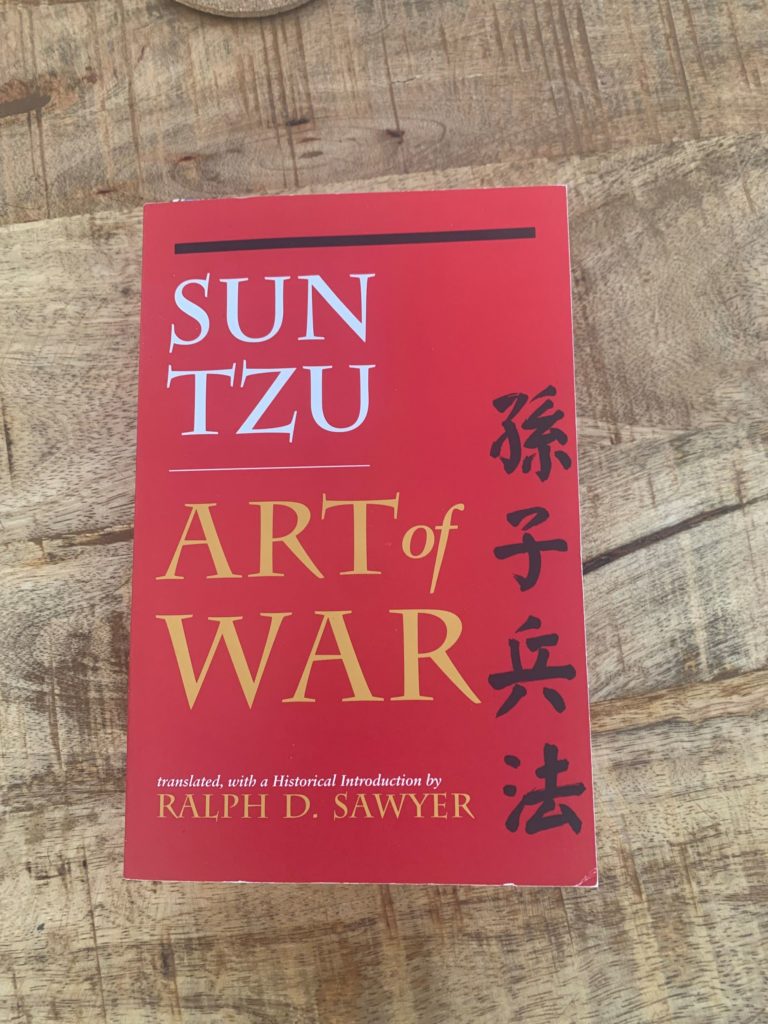And we are off. The Art of War is a short book. Mine is 77 pages and that is broken up into 13 chapters. Each week, it should be pretty easy to read the chapter and have some time to digest the meaning. I didn’t just read three pages however, my version has 162 pages of foreword, history and scene setting. Like Dante’s Italy, I had no idea about the history and politics of 500 BC (or the politically correct BCE) China. Truth be told, when any book starts adding a ton of foreign names, I kind of get lost.
It can be the Bible or a fantasy novel it is all the same, if the text is full of unfamiliar names I start to gloss over. So, I didn’t get a lot out of the pretext but a few things. Sun Tsu could be a pen name. He was likely an advisor to one of the Chinese emperors. This book is one of seven classic tactical texts albeit the best known.
The translator Ralph Sawyer relates the thirteen principles to several battles that Sun Tsu allegedly orchestrated. I suppose that this is an attempt to justify the validity of the principles based on the outcome of the battle. But, I am going to save you all of that anguish and we will assume that this is valuable wisdom that we can apply in today’s battles. Whatever those are.

This is my own principle. Never get involved in conflict with someone that has nothing to lose. What does that mean? It means that I have more important things to do than fight. I won’t use any names here but there is a person in my life that is chronically underemployed. This is also a very difficult person to get along with in the best of times. I suspect that the two things are related.
This person has been in the ‘system’ for many years and really nothing better to do, I don’t have the experience, desire or resources to get involved in a legal battle or other such things. I am not saying it is right but a better option is to pay some ransom than waste a bunch of time or resources fighting. The only loser in this scenario is me.
My philosophy is an homage to another Sun Tsu idea. Only fight battles that you are going to win. How do you know that you are going to win? It comes down to the initial estimation. There are five parameters that Sun Tsu says general need to know. They would be Tao, Heaven, Earth, generals and military organization. These are slightly abstract metrics to me anyway, especially when you read the definitions.
- Tao is the affinity of the soldiers to the ruler
- Heaven is the Yin/Yang
- Earth is the terrain
- Generals are generally the skill and ability
- Military organization includes things like troop strength and logistical support.
I don’t really want to get into analysis of each of these points but the thing that I notice is that this is really a holistic evaluation. Most people would probably only consider the last three elements in the evaluation and not necessarily the intangibles like ‘We have been on a real lucky streak, is this likely to continue?’ I think the thing to really take away from this is that an evaluation should be performed with a set of values that make sense for the situation.
Having never been a soldier, I cannot speak to that in particular. However, I have seen where weak initial estimations have come back to haunt time and time again. In the software business, I have seen underselling or underestimation of the scope and complexity cause virtual losses in battle. The poor generals lead troops that don’t have respect for the leaders. Logistical support is absent and the terrain is unknown. On top of that the Yin/Yang is not balanced because the plan is to make up the poor bidding with change orders or code in an attrition environment. Grind out the new workers who haven’t paid their dues.
How often do construction projects go double or triple the budget? Way too often because estimation is often more difficult than actually doing the work. Estimation is an interdisciplinary skill that requires knowledge of what needs to be done as well as a little bit of of poker. You have to know where the problem spots are likely and places where the project is likely to give and take.
Too often, this job is left to a polished smooth talker rather than a subject matter expert that has transitioned to a sales role. Also companies dig holes too deep by leveraging artificial advantages like off-shore workers (low rates) or currency conversions (converting a stronger dollar to weaker currencies for margins). This tricks might work to get out of a jamb but often put the short term profits over strategic partnerships or a happy workforce.
End Your Programming Routine: No, I have not confused business with war. Only one do I know anything about but I definitely concur that initial estimations are critical if you want to win the battle. Maybe Sun Tsu’s five parameters are adequate for war? What I can say is that parameters critical for success should be defined for the endeavor you are engaged in. They should be evaluated and refined with feedback. When this skill is mastered, then you will be prepared to determine whether or not to engage.
Recent Comments